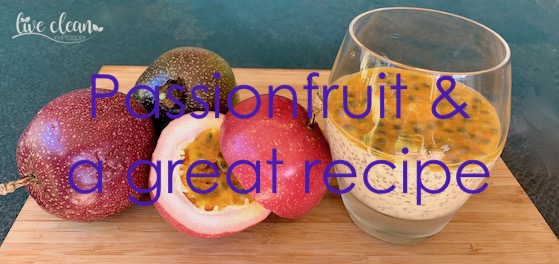Todays post is about Passion fruit. We have a very healthy passion fruit vine on a shared fence at the moment, so we have a good supply of fruit.
I really like passion fruit, though not always with the seeds. It is also a good source of nutrients, especially fibre, and vitamins C and A. So I decided to make some nectar.
After harvesting a dozen fruit off the vine, which were all ready to eat. I put the pulp from all of the fruit into the blender and pulsed it for a couple of seconds. To seperate the seeds, I then put the mixture in a sieve over a bowl and rubbed the nectar through the sieve to remove the seeds. This made approximately 250 ml of passion fruit nectar. The nectar is really versatile; you can mix it with soda water for a refreshing drink of pour it over ice cream.
I decided to make a really easy Chia Mousse. Something healthy enough to have for breakfast and yummy enough to eat for dessert.
Passion fruit Coconut Chia Mousse
serves 1
- 70 ml Coconut Cream
- 60 ml milk or water (or non dairy milk)
- 3 tablespoons Passion fruit nectar
- ¼ cup Chia seeds
Just mix all of the ingredients together, pour into a glass and refrigerate till set. (approx. 1hr)
Top with the pulp of 1 passion fruit.
The passion fruit health profile.
Passion fruit is a beneficial fruit. It contains high levels of vitamin A, vitamin C, Beta-carotene, Magnesium, Iron, Potassium, Phosphorus, Niacin, and approximately 2 grams of fibre.
It’s also rich in beneficial plant compounds, including antioxidants such as carotenoids and polyphenols. In fact, one analysis found that passion fruit was richer in polyphenols than many other tropical fruits.
Polyphenols are plant compounds that have a range of antioxidant and anti-inflammatory effects. This means they may protect against chronic inflammation and diseases like heart disease and cancer.
Antioxidants play a vital role in keeping the body systems healthy. Scientists know that antioxidants improve blood flow, specifically to the brain and nervous system.
Beta-carotene is also an important antioxidant. In your body, it is converted to vitamin A, which is essential for preserving good eyesight.
Our body doesn’t usually absorb iron from plants very well. However, the iron in passion fruit comes with a lot of vitamin C, which is known to enhance iron’s absorption.
Vitamin C is an important antioxidant that you need to get from your diet. It helps support a healthy immune system and healthy ageing.
For such a small fruit, passion fruit is packed with nutrients that our body needs.
The Chia seeds
I have written before that Chia can be considered a legitimate super food because of its nutrient content. The seeds are full of healthful omega-3 and omega-6 fatty acids; they have high levels of protein, fibre, and no cholesterol. They also contain several minerals in significant amounts, including calcium, phosphorous, potassium, zinc, copper, and manganese.
So for a super easy, very nutritious snack, give this recipe a try.
Till the next post,
Live clean n prosper.


